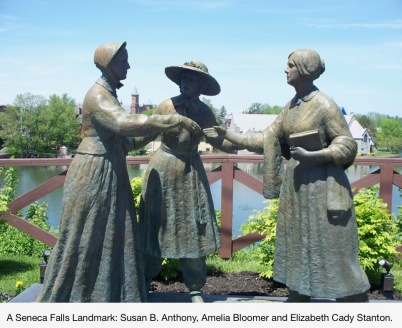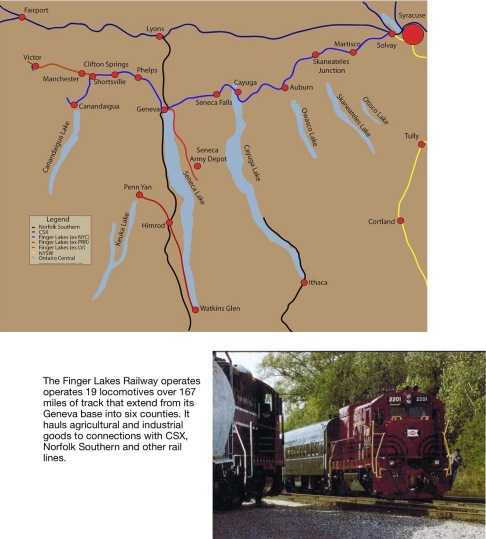Seneca Meadows Inc. Operates Under a State Air Quality Permit That Expired in 2012
In Seneca Falls, homeowners slam their windows shut when foul odors from the state’s largest landfill, Seneca Meadows Inc., waft their way. An artificial grape-flavored air freshener intended to cover up the stench hardly helps.
Local hotels that tend to earn favorable reviews for service draw their share of blistering complaints of “noxious odors…eye and skin irritation…massive landfill that smells horrendous…even inside you can still smell it.”
At the four schools nearby, children avoid their playgrounds when it gets really nasty. “The smell is breaking our brain cells,” one young student testified to state Department of Environmental Conservation officials recently at a crowded public hearing.
More than 20 other speakers at the Aug. 10 hearing in Seneca Falls complained that landfill odors were wrecking their quality of life and/or eroding their home values. They stood to urge the DEC not to grant Seneca Meadows the 10-year extension it seeks for its state operating permit.
That state permit expired yesterday — Oct. 10 — a deadline the DEC let pass quietly without disturbing landfill operations. The old permit will be good until the agency finally decides how to handle the renewal application, even if that’s months or even years away.
It’s OK to treat the permit expiration date as “soft” deadline, the DEC maintains, because the landfill has applied for renewal. That tactic takes the pressure off everyone and has been applied before. Seneca Meadows still operates under a state air quality permit that expired in 2012.
The landfill, owned by Toronto-based Waste Connections Inc., accepts up to 6,000 tons of trash a day from 47 counties in New York, as well as the states of Massachusetts, Connecticut, New Jersey, New Hampshire, Pennsylvania. And Canada. It currently uses about 40% of the nearly 900 acres it owns between the towns of Seneca Falls and Waterloo.
The gases that escape the landfill are primarily methane and carbon dioxide, which don’t smell. The foul air comes from volatile organic compounds found in trace amounts in landfill gases. Seneca Meadows said it has spent $7.5 million over the past two years on systems to contain the odors.
Still complaints flood in to an odor hotline that the DEC has outsourced to the landfill. The agency scrutinizes the landfill’s hotline paperwork. Citizens’ complaints often include a comment from a landfill official such as, “No odors detected at time of investigation.”
That can be immensely frustrating in no small part because it’s often true, said Barbara Reese of Seneca Falls. A change in wind direction can improve the air — and make her complaint seem frivolous.
Reese, whose home is three miles east of the landfill in an in-town neighborhood, says she’s called the odor hotline at least 75 times over two years.
“When I smell the landfill, I call the hotline,” she said in a recent interview. “I give them the info and sometimes they’ll come by. When they’re done, it generates a piece of paper, a checklist that they send to me and the DEC and the town. I save them because it’s a violation of state law and local code … for odors to affect my life. As I walk to church Sunday morning, I smell it. It’s part of my everyday life.”
A manager at the Hampton Inn in Waterloo, less than a mile from the landfill, vented her own frustration in an online post this month in response to a guest who had complained on the website TripAdvisor of the landfill’s “stench.”
“I truly apologize for the Seneca Meadows Landfill nearby! As a business and residents of the area, we are constantly fighting the growth of the landfill but unfortunately we can only continue to provide excellent customer service and cleanliness to help show that our Hampton is an Award Winning Hampton and we do not let the landfill define us.”
Easier said than done for Seneca Falls, the home of the country’s first Women’s Rights Convention in 1848 and the hoped-for 2018 opening of the National Women’s Hall of Fame.
The 1848 convention was organized by Seneca Falls resident Elizabeth Cady Stanton, whose landmark statue (with Amelia Bloomer and Susan B. Anthony) overlooks the Seneca River. Fundraising for the Hall continues, and its first floor is due to open next year.
But will visitors drawn to that showcase of women’s history — or to the flourishing Finger Lakes wine trails nearby — have to hold their noses?
For local officials, the policy choices aren’t simple. Seneca Meadows provides more than 100 local jobs and a major chunk of the local tax base, plus it works hard at being a good corporate citizen.
At the DEC hearing Aug. 10, representatives of the local Chamber of Commerce and the Farm Bureau spoke in favor of the landfill’s requested 10-year permit extension. So did Lacey Gardner of the Montezuma Audubon Center, a 198-acre bird sanctuary in Savannah, which the landfill has supported.
Last December, the town board voted 4-1 for Local Law 3, which mandated closure of the landfill by Dec. 31, 2025. However, that tally included two ‘yes’ votes from lame-duck members who had just been defeated in the November election by pro-landfill candidates.
In May, the new town board voted 3-2 for Local Law 2, which cancelled that previous law and gave the landfill life beyond 2025. But last month a state Supreme Court judge wrote that the town board had improperly sidestepped environmental issues.
“It defies credulity that the town took a hard look at the environmental impacts resulting from the continued operation of the landfill after 2025 and were able to determine that there was no one single area of environmental concern that would result in any impact more than a small impact,’’ Judge William Kocher wrote on Sept. 13.
Absent a harder look at those issues, the judge declared, Local Law 2 is invalid.
The pro- and anti-landfill camps are sharply divided, and tempers have flared.
Town board member Thomas Ruzicka faces third-degree assault charges against fellow board member Dave DeLelys stemming from an incident at a local restaurant hours after the May vote on Local Law 2. Ruzicka had voted for it, DeLelys voted the other way.
At the restaurant, DeLelys alleges, Ruzicka rose from a bar stool when he and his wife were passing by and grabbed DeLelys by the shirt. The case is set for the Waterloo Town Court Oct. 27. Ruzicka has pled not guilty.
Meanwhile, John C. Garee faces charges of making terroristic threats, a Class D felony, against Seneca Falls Town Supervisor Greg Lazzaro and Seneca Meadows District Manager Kyle Black. That case goes to the Waterloo court Nov. 17. Garee has pled not guilty.
Lazzaro has become a lightening rod for critics of the landfill.
At the DEC hearing in August, several speakers attacked Lazzaro for campaigning for town supervisor in 2015 as a candidate in favor of setting a landfill closing date and then, once in office, reneging. “We didn’t know we were voting for a flip-flopper,” Frank Magner testified.
Last spring, Lazzaro helped ram through the landfill’s local permit renewal, which had been delayed for months pending completion of an odor mitigation plan. He did so against the advice of the then-town attorney, Patrick Morrell, by simply ignoring the odor mitigation plan.
Morrell later resigned after Lazzaro asked him to leave. “I recently met with Supervisor Lazzaro and board member Lou Ferrera, who asked me to submit my resignation,” Morrell told The Finger Lakes Times in July. “This was not expected or anticipated. I enjoyed working for the town for 15 years and anticipated continuing to do so.”
Lazzaro has also spoken out at rallies against the use of trains to haul trash to Seneca Meadows.
Two years ago, the landfill’s previous owner, Toronto-based Progressive Waste Solutions, bid for a long-term $3.3 billion contract to accept New York City trash by rail. Progressive failed to close that deal last year, and weeks later it completed a $2.7 billion merger with Waste Connections, which had been based in Texas.
(The combined company, owned 70% by Waste Connections shareholders and 30% by Progressive shareholders, kept the Waste Connections name and Progressive’s Canadian headquarters. Waste Connections is now the No. 3 waste services company in the U.S. after Waste Management and Republic Services.)
New York City has since awarded its main trash contract to Waste Management. But that doesn’t necessarily mean Seneca Meadows is out of the running for a share of that business in the future, especially if the proper rail links are in place.
For years, Geneva-based Finger Lakes Railway has expressed interest in serving Seneca Meadows. The company hauls agricultural and industrial freight on 167 miles of track, with connections to CSX, Norfolk Southern and other raid lines.
In 2009, a proposed Seneca County rail improvement program that sought $17.5 million in federal transportation funds for improvements and expansion included the following: “The project’s regional public benefit it clear. Reopening and improving the Geneva-Lyons track to reestablish the Lyons interchange with CSX; expanding passenger service infrastructure, and developing the Class 2 rail connection and rail yard at Seneca Meadows will be a substantial boon to the region — one whose effects will dramatically improve the business and industrial climate of the central Finger Lakes area.”
In June the railroad announced plans to spend $850,000 on track improvements.
Tracks behind the landfill have already been upgraded, according to Bill Lutz, owner of Waterloo Container, which abuts the landfill property.
“At any point in time, Waste Management could subcontract with Seneca Meadows” for a piece of the New York City trash business, Lutz said.
It’s logical to assume that Finger Lakes Railway will continue to seek landfill business into the indefinite future, he said. Given Lazzaro’s recent pro-landfill stances, it’s doubtful that he’s still an adamant foe of trash trains, Lutz said. “I think Mr. Lazzaro is going to support all of that,” he said.
Seneca Meadow’s application to the DEC to renew its state operating license seeks to maintain its 6,000-ton daily volume, the largest in the state. It also requests that a tire recycling operation be included in the landfill’s permit and not be subject to a separate permit.
In an email, DEC spokeswoman Erica Ringewald said the agency is “carefully considering comments received at the public hearing on August 10, as well as comments submitted in writing by the August 18 deadline as it evaluates renewal of the permit.
Ringewald said that the landfill can continue operating under its expired permit because its renewal application was found to be “timely and sufficient.”
She noted that the agency’s action is allowed under the State Administrative Procedures Act, or SAPA, and that “current permit requirements and strict DEC oversight will continue.”
The landfill’s Title V Air Pollution Control permit, which expired in 2012, “is also in a SAPA-extended status,” she added. “DEC is in the process of renewing the Title V permit and the required public notice and draft permit are anticipated to be provided in the near future.”

